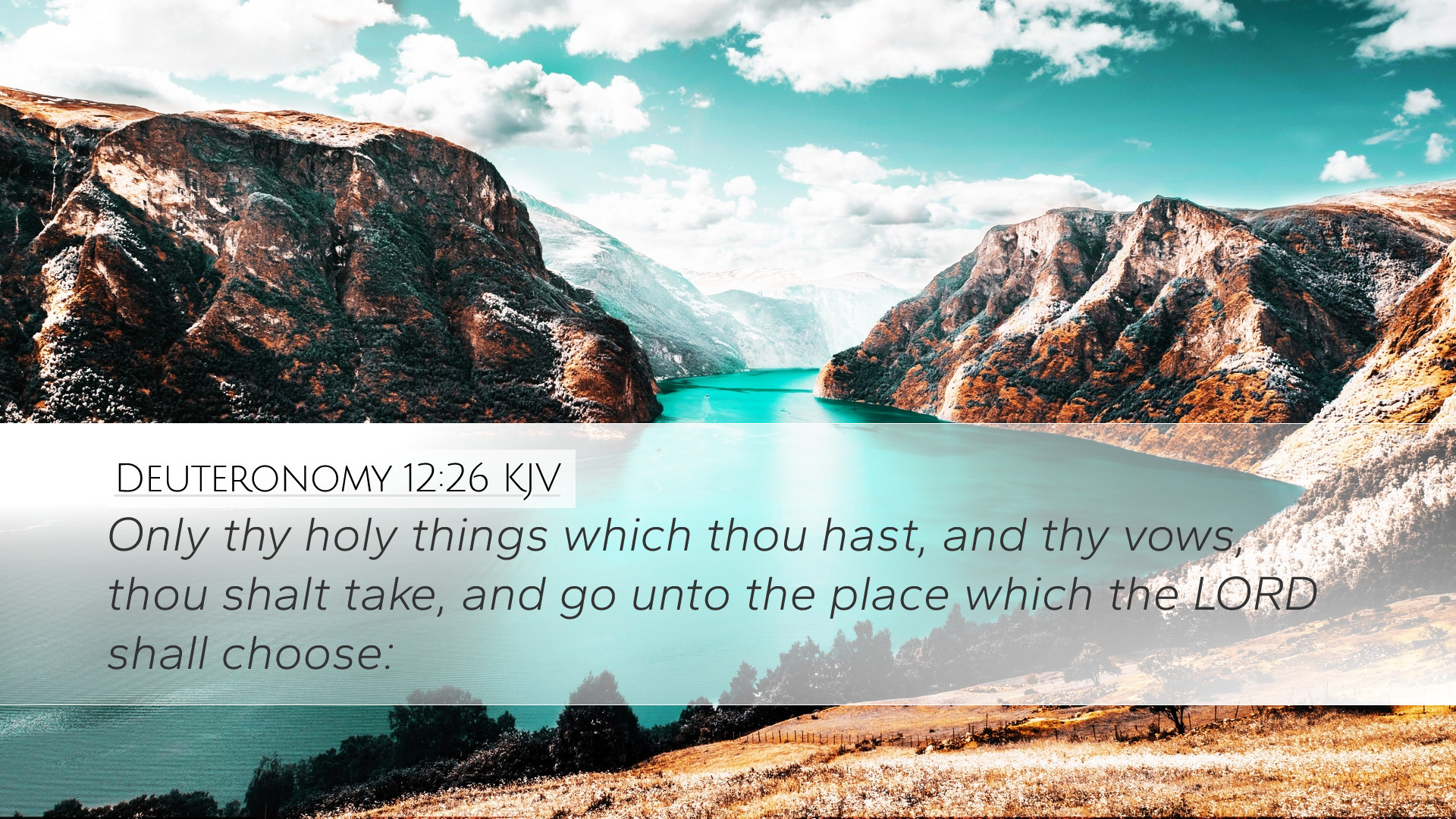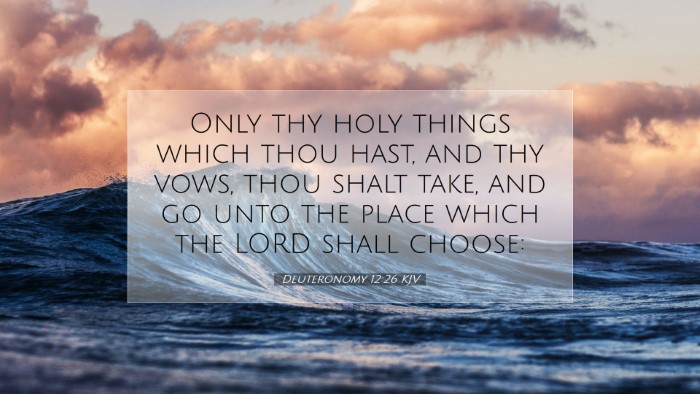Commentary on Deuteronomy 12:26
Deuteronomy 12:26 states: "Only thy holy things which thou hast, and thy vows, thou shalt take, and go unto the place which the LORD shall choose." This verse comes from a larger discourse about worship and the centralization of sacrifices and offerings in the life of Israel.
Contextual Overview
This verse is situated within Moses’ address to the Israelites as they prepare to enter the Promised Land. The emphasis is on the proper observance of worship rituals, which should be directed to the designated sacred place chosen by God. This reflects a shift from localized worship to a centralized system, aiming to unify the Israelite community.
Commentary Insights
Matthew Henry's Commentary
Matthew Henry emphasizes the significance of "holy things" and "vows." He notes that holy things refer to those items dedicated to the service of the Lord, including offerings and sacrifices. Such offerings are sacred and must be treated with reverence.
Henry asserts that the act of taking these items to the specified place of worship underscores obedience to God's command and the importance of fulfilling vows made to the Lord. He explains that this practice also promotes a sense of community as the people gather to worship in unity, bringing their offerings together as a collective act of devotion.
Albert Barnes' Commentary
Albert Barnes highlights that this directive serves to ensure that the Israelites maintain a consistent approach to worship. He points out that taking "holy things" and "vows" emphasizes personal responsibility in honoring God with what has been consecrated. Barnes mentions that the term "vows" is significant, denoting promises made during times of need or necessity, which ought to be fulfilled faithfully as a demonstration of faith and reverence.
He also notes that the phrase "the place which the LORD shall choose" carries assurance that God will provide a specific location for true worship, thereby removing uncertainty regarding where sacrifices should be offered. This reflects the divine care and guidance in the spiritual life of the Israelites.
Adam Clarke's Commentary
Adam Clarke focuses on the concept of holiness, elaborating on what it means to have "holy things." He explains that these consist of items set apart for divine use, which should not only be physically transported but also spiritually honored.
Clarke asserts that the requirement to go to the chosen place emphasizes a physical journey towards God’s appointed assembly, which fosters a connection between the people and their God. He believes this journey symbolizes the spiritual journey of all believers, denoting a need for intentionality in worship and the reflection of one’s commitments through tangible acts.
Theological Implications
The directive to bring holy things to the designated place is rich with implications for both ancient and modern worship. It draws attention to the themes of stewardship and accountability in the believer’s relationship with God.
- Stewardship of Holy Objects: The call to bring dedicated items signals a responsibility to manage what is holy, encapsulating the idea that all believers are stewards of God’s blessings.
- Fulfillment of Vows: The importance placed on vows in this verse is a reminder for contemporary believers to honor commitments made to God, fostering a culture of integrity and faithfulness.
- Centrality of Worship: The movement towards a centralized place of worship mirrors the New Testament theology, where Jesus emphasizes the significance of communal worship and the body of Christ functioning together.
- Divine Guidance: The assurance that God will choose the place for worship underscores the belief that God actively guides His people, reinforcing trust in divine providence.
Practical Applications for Today
As pastors, students, and scholars engage with Deuteronomy 12:26, several practical applications emerge:
- Encouragement for Worship Communities: This verse can inspire local churches to create spaces where congregants can bring their "holy things"—their time, talents, and treasures—as acts of worship.
- Reinforcement of Vows: Leaders can encourage congregants to verbalize and meditate on their commitments to God through public testimony, ensuring that the act of vow-taking remains a vital aspect of faith practice.
- Holistic Approach to Worship: Use this verse to remind congregations that true worship involves both hearts and hands—where congregants are encouraged to give back as part of their spiritual journey.
Conclusion
Deuteronomy 12:26 serves as a significant reminder of the attributes of holiness, responsibility, and unified worship in the believer's life. By synthesizing insights from Matthew Henry, Albert Barnes, and Adam Clarke, one gains a multifaceted understanding of the text that speaks to the heart of communal worship and the centrality of God’s presence among His people. It challenges and inspires modern worship practices, calling believers to live out their faith with intentionality and reverence.


